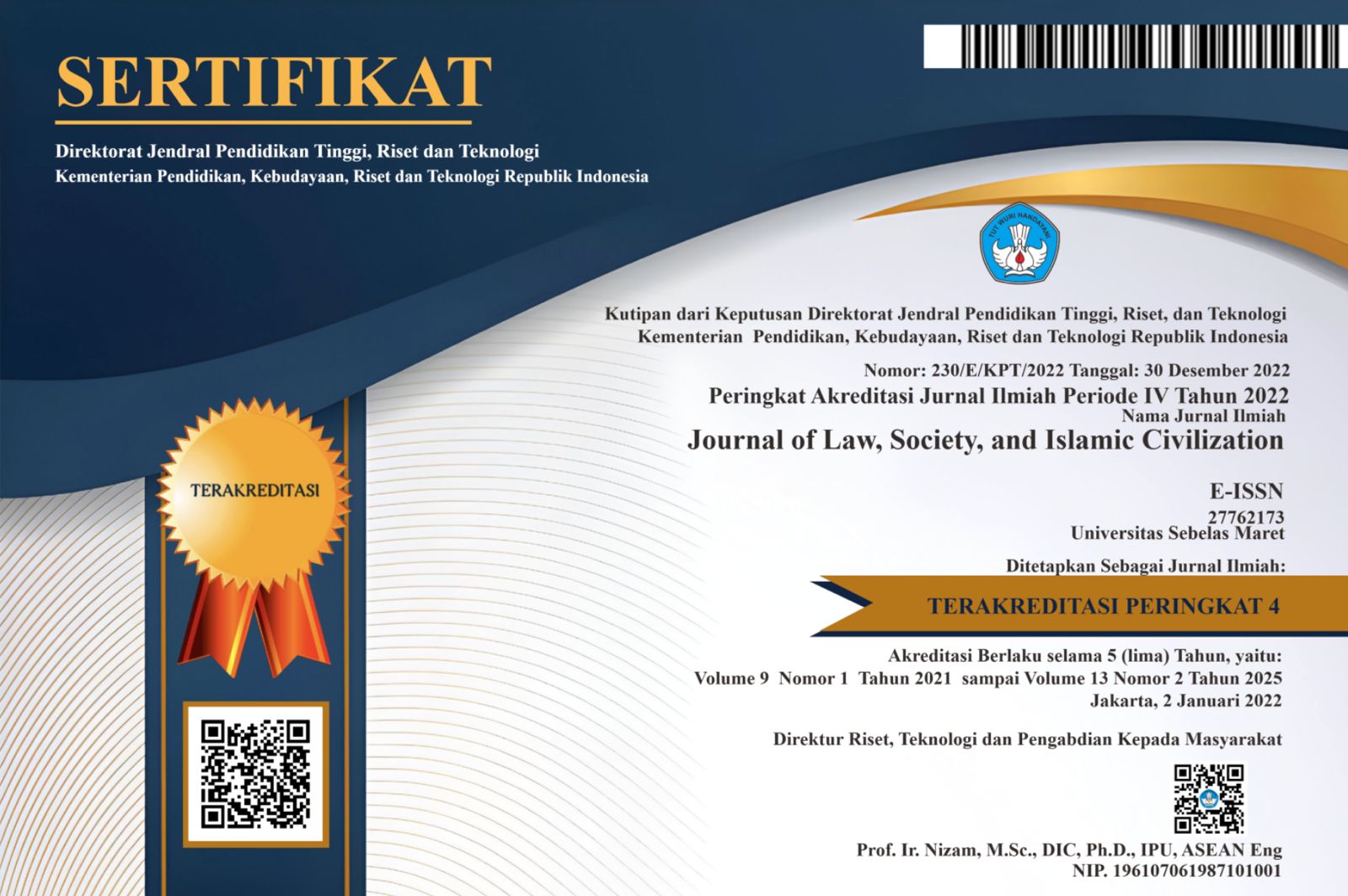Perkawinan Sedarah Suku Polahi Ditinjau dari Undang-Undang Nomor 16 Tahun 2019
Abstract
This research tries to explain incest in the Polahi tribal tribe, who dwell among the interior woods of Gorontalo, more specifically in the forests of the Boliyohuto region, Tamaila Village, Tolangohula District, Gorontalo Regency, a culture that is deeply rooted in the local population. The research technique employed is prescriptive and applied normative legal research. Primary and secondary legal documents, as well as literary and document studies, were utilised as sources of legal materials. In the Polahi tribe, inbreeding occurs when a person reaches maturity (both male and female) and is matched with their own siblings. Inbreeding is illegal in marriage, according to the conclusions of this research, under Law Number 16 of 2019 about Amendments to Law Number 1 of 1974 Concerning Marriage, which stipulates that marriage is prohibited between two persons connected by blood, breast milk, and marriage. As a result, the Polahi Tribe has been found to have broken Article 8 of the Marriage Law. If the husband and wife knew before they married that inbreeding was banned by law or religion, the marriage would be considered illegal, and the child's status would be void. As a result, the kid that is born only has a favourable position in terms of inheriting and supporting the original mother and her family. Meanwhile, the government, in this instance the Gorontalo Regency Government, is working to eliminate the practise of inbreeding within the Polahi Tribe's customary law group. The situation of children born from incestuous marriages because their parents were unaware that their union broke the marriage restriction is still relevant. In the meanwhile, if both parties are aware that the marriage is prohibited under Shari'a, the marriage must be cancelled. If they do not end the marriage, it becomes a legal marriage, and the child's status becomes invalid. As a consequence, children that are born are only in a better position to inherit and support their birth mother and family.
Full Text:
PDFReferences
Jurnal:
Fure, A. A. (2016). Kedudukan Anak Akibat Batalnya Perkawinan Karena Hubungan Darah Menurut Hukum Positif. Lex Privatum, 4(3).
Hidayat, I. (2017). Suatu Telaah Tentang Keberadaan Anak Sumbang Dalam Mewaris Di Lihat Dari Aspek Hukum Adat. Jurnal Ilmiah Universitas Batanghari Jambi, 15(1), 61-66.
Iman, Y. S., & Poedjiastoeti, S. (2020). Penegakan Undang-Undang Nomor 16 Tahun 2019 tentang Perkawinan dalam Rangka Mencegah Perkawinan Sedarah sebagai Perilaku Menyimpang yang Dilakukan oleh Suku Polahi di Kabupaten Gorontalo Dihubungkan dengan Hukum Positif Indonesia. Prosiding Ilmu Hukum, 6(1), 51-54.
Larasati, F. C., Sugiono, Adonara F. F. (2013). Hak Waris Anak Incest Terhadap Harta Orang Tua Biologisnya (Incentuous child’s Inheritance Rights For Property of Their Biological Parents). Fakultas Hukum: Universitas Jember.
Meteng, G. M. (2022). Perkawinan Sedarah Suku Polahi Gorontalo Ditinjau Dari Pasal 8 Undang-Undang Nomor 1 Tahun 1974. Lex Crimen, 10(13).
Pomalingo, S. (2015). Polahi: Komunitas Pedalaman Suku Gorontalo. Cultura: Jurnal Dinamika Sosial & Budaya Universitas Negeri Gorontalo, 1(1), 53-62.
Setiaji, A. (2017). Budaya Perkawinan Sedarah dan Sistem Sosial Kekerabatan di Masyarakat Suku Polahi Gorontalo. Fakultas Ilmu Budaya Universitas Diponegoro.
Tilome, A. A., & Alkatiri, R. (2020). Makna Perkawinan Sedarah Bagi Warga Suku Polahi di Indonesia. Ideas: Jurnal Pendidikan, Sosial, dan Budaya, 6(2), 123-134.
Buku:
Peter Mahmud Marzuki. 2014. Metode Penelitian Hukum. Jakarta: Kencana Pernada Media Grup.
Sri Soesilawati Mahdi, Surini Ahlan Sharif dan Akhmad Budi Cahyono. 2005. Hukum Perdata (Suatu Pengantar). Jakarta : Gitama Jaya Jakarta.
Skripsi, Tesis, dan Disertasi:
Libertus, Y. R. (2020). PRAKTIK PERKAWINAN SEDARAH (INCEST) DALAM TRADISI LOKAL MASYARAKAT LIO (Studi Etnografis Pada Masyarakat Di Desa Paga, Kecamatan Paga, Kab. Sikka) (Doctoral dissertation, Universitas Muhammadiyah Malang).
Maharani, P. (2016). Status Kedudukan Anak Dari Pembatalan Perkawinan Sedarah (Incest) Ditinjau Dari Uu No. 1 Tahun 1974 Tentang Perkawinan Di Pengadilan Agama Yogyakarta (Studi Kasus Putusan Nomor: 216/PDT. G/1996/PA. Y (Doctoral dissertation, Universitas Muhammadiyah Yogyakarta).
Nurhasanah, S. (2017). Perlindungan Hukum Terhadap Hak Anak dari Perkawinan Sedarah (incest) dalam Perspektif Hukum Islam dan Hukum Negara. Skripsi. Fakultas Hukum: Universitas Lampung.
Peraturan Perundang-Undangan:
Undang-Undang Nomor 1 Tahun 1974 tentang Perkawinan.
Undang-Undang Nomor 16 Tahun 2019 tentang Perubahan atas Undang-Undang Nomor 1 Tahun 1974 tentang Perkawinan.
Peraturan Pemerintah Nomor 9 Tahun 1975 tentang Perkawinan.
Refbacks
- There are currently no refbacks.












